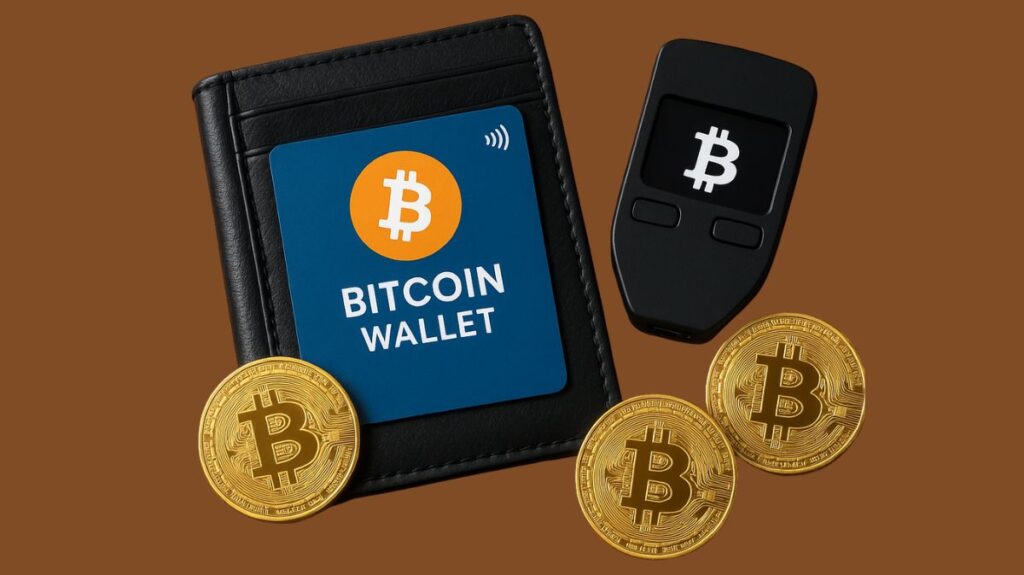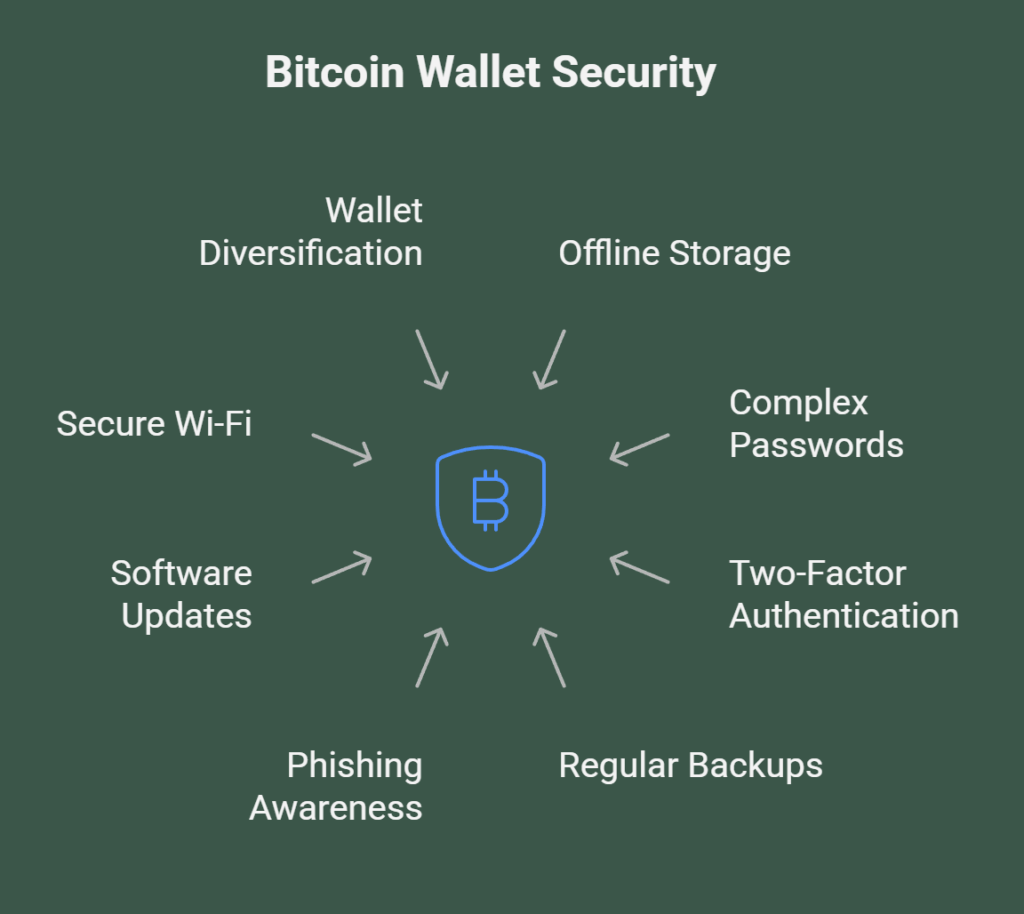Bitcoin wallet

You may safely store, send, and receive bitcoins via a digital tool called a wallet. It is a program, gadget, or service that maintains your cryptographic keys (private and public), which are necessary for handling and conducting transactions with your Bitcoin. It is not like a real wallet that contains currency. The wallet provides you control over your Bitcoin, but it never stores the cryptocurrency. Instead, it always stays on the blockchain.
How Bitcoin Wallets Work
Bitcoin wallets use public-private key cryptography.
Private Key
Your private key, a 256-bit random code, controls the Bitcoin tied to your public key. Because you can spend and sign bitcoin transactions, it must be disguised. You will never be able to access your bitcoins again if it is compromised or lost.
Public Key (Bitcoin Address)
Your public key, also known as your bitcoin address, is what you share to get paid and is obtained from your private key. It is a shorter, human-readable string that is comparable to your bank account number. For privacy protection, Bitcoin wallets frequently create new addresses for every transaction, even when previously used addresses continue to work.
Your wallet creates a cryptographic proof that you are the rightful owner approving the transfer by using your private key to “sign” the transaction when you wish to transmit Bitcoin. The blockchain is then updated with this signed transaction after it has been broadcast to the Bitcoin network. Wallets also let you query the blockchain to view your balance and transaction history.
A seed phrase, sometimes referred to as a recovery phrase or mnemonic phrase, is frequently used to build the hierarchical deterministic (HD) wallet structure seen in many contemporary Bitcoin wallets. The wallet may generate an infinite number of public and private key pairs from this seed phrase, which is usually a string of 12 or 24 syllables and serves as a master key, making backups and recovery easier.
Why You Need a Bitcoin Wallet
Without a wallet, you are unable to directly engage with the Bitcoin blockchain. With a wallet, you can:
- Keep your keys in a safe place.
- Verify your transaction history and balance.
- Bitcoin is simple to send and receive.
- Without a central authority, control your digital identity and approve transactions.
Types of Bitcoin Wallets
Each Bitcoin wallet presents a distinct balance of convenience and security, and they are often categorized by internet connection.
Hot Wallets (Connected to the Internet)
These are easily accessible for regular transactions because they are linked to the internet. However, because they are online, they are typically regarded as less safe for storing significant sums of Bitcoin and are more susceptible to virus, phishing, and hacking.
Also Read About Understanding Cryptography Mechanisms In The Blockchain
Examples
- Mobile wallets are smartphone apps that hold cryptographic keys directly on your device. They are useful for managing your finances while you’re on the go and frequently have QR code scanning capabilities. Trust Wallet and BlueWallet are two examples.
- A web browser accesses web wallets. These may include:
- Custodial: Your private keys are kept on your behalf by the service provider (such as Coinbase, Binance, or Kraken). Although it’s convenient, you don’t have complete control over your money.
- Non-custodial: Even when using a web interface to access the wallet, you still have control over your private keys.
- Desktop wallets are computer programs that keep keys locally stored on your computer. Although they give you more control than other web wallets, they are susceptible to malware on your computer. Bitcoin Core, Atomic, Exodus, and Electrum are a few examples.
- Browser extensions are programs that provide you direct access to the blockchain via your web browser, such as Electrum.
- Advantages of Hot Wallets: Easy to use for fast transactions, frequently free, and suitable for novices due to their user-friendly interfaces.
- Cons of Hot Wallets: You don’t actually own your private keys with custodial wallets, and they are more susceptible to internet attacks.
Cold Wallets (Offline)
These are far more secure for long-term storage of substantial quantities of Bitcoin against online attacks because they are not connected to the internet. Because they require an internet connection to sign transactions, they are less practical for frequent use.
Examples
- Hardware wallets are actual gadgets made especially to hold private keys offline; they frequently resemble USB drives. Transactions are signed internally and then broadcast by a linked computer, so the private keys never leave the device. They are generally regarded as the safest choice for cryptocurrency storage. Ledger devices like the Flex, Stax, Nano X, and Nano S Plus are hardware wallets. Private keys are on secure element chips and require a PIN and 24-word recovery phrase.
- A tangible copy of your private and public Bitcoin keys, commonly in QR code form. They are offline and cyberattack-proof, but less user-friendly and subject to theft, loss, and physical harm.
- Benefits of Cold Wallets: Best protection against internet threats and ideal for long-term Bitcoin storage.
- Cold wallets can be lost or damaged, cost more (hardware wallets), and make frequent transactions harder.
Bitcoin Wallets Security

Wallet type aside, certain security basics are necessary:
- Keep your private keys and seed phrase offline, in a hardware wallet, or written down in various secure places.
- Create complex wallet passwords with a password manager.
- Enable 2FA for security on your wallet or exchange. SMS is less secure than Google Authenticator.
- Backup your wallet, especially your seed phrase, often in case your smartphone is lost, stolen, or damaged.
- Phishing scams: Check mails and URLs to protect data.
- Update software: Wallet software needs frequent updates for security patches.
- Avoid unsafe public Wi-Fi for wallet access and purchases.
- Diversify Bitcoin wallets. Hot and cold wallets can be used for long-term savings and daily spending.
Over 7 million consumers trust Ledger hardware wallets to secure Bitcoin. They partner with the Ledger Live App for asset management, balance checking, and transaction history tracking. The hardware wallet verifies transactions, allowing Ledger Live and Ledger device users to safely conduct transactions. Lightning is not supported by Ledger Bitcoin wallet.
Best bitcoin wallets 2025
The 12 Best Cryptocurrency Wallets (July 2025)
| Wallet | Best For | Rating |
|---|---|---|
| Tangem | Overall | 4.8 stars |
| MetaMask | Ethereum | 4.8 stars |
| Phantom | Solana | 4.5 stars |
| Rabby | User Interface | 4.4 stars |
